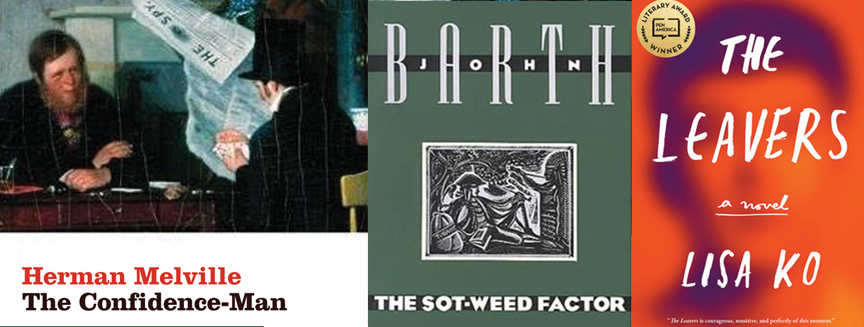
- This event has passed.
American Writing: Changing Locations

American Writing: 4 Seasons
Season 1: Changing Places in America
Herman Melville, The Confidence-Man (1857). John Barth, The Sot-Weed Factor (1960) Lisa Ko, The Leavers (2017)
In his 1970 essay “Philosophy and the Form of Fiction,” William Gass brought the term “metafiction” forward to the reading public as a way to characterize the work writers such as Borges, Barth, Flann O’Brien, as well as the type of novels Gass himself would write. He described metafiction as writing “in which the forms of fiction serve as the material upon which further forms can be imposed”. Does metafiction provide escape for the committed writer from the bourgeois strictures that the novel form imposes? As critical readers we need to check out all the angles. The metafiction form will over time become incorporated as yet another aspect of modern fiction as ultimately there is no way to over-ride what happens when ink is committed to paper, impulses to the interactive screen.
American fiction writers have lots to write about. We are introducing a four term look at writing by American authors who have novels appropriate to four themes important to critical thinkers of the broad American questions on nation, class, race and gender. Much of this fiction becomes part of what our unfolding reality is as a nation, group of nations, as aspiring internationalists. Many of the fictional works we will read are not as formally postmodern or would formally fall in the metafiction category as delineated by Barth.
Our first thematic 12 week term concerns Change of Place.
This first session will begin with Melville. Though centered around the title character, Melville’s The Confidence-Man portrays passengers on a steamboat with stories that are told as they travel to New Orleans down the Mississippi River. The narrative structure is reminiscent the Canterbury Tales.The novel is written as cultural satire, and metaphysical treatise, and deals with a number of themes including sincerity, economic dislocation and materialism, identity, cynicism, and more.Many critics have placed The Confidence-Man alongside Moby Dick and “Bartleby, the Scrivener” as precursors to 20th-century literary preoccupations around nihilism, the absurd and existentialism.
Dale Jones citing R. W. B. Lewis, who feels the necessity of defining a new genre for [The Confidence- Man] and its literary descendants: “it is the recognizable and awe-inspiring ancestor of several subse- quent works of fiction in America: Mark Twain’s The Mysterious Stranger, Nathaniel West’s The Day of the Locust, Faulkner’s The Hamlet, Ralph Ellison’s Invisible Man, John Barth’s The Sot-Weed Factor, Thomas Pynchon’s V. Melville bequeathed to those works . . . the vision of an apocalypse that is no less terrible for being enormously comic, the self-extinction of a world characterized by deceit and thronging with imposters and masqueraders…”
A worthy contender for the title of Great American Novel, Barth’s masterpiece is a work of astonishing virtuosity and range to some. Others look at this, as did the author himself, as the end of the novel as known before it’s publication. Barth had changed midstream in the writing of The Sot-Weed Factor. Among American novels, in terms of sheer linguistic brilliance, it is surpassed only by Thomas Pynchon’s Mason & Dixon and Melville’s matchless Moby Dick.
Here is Barth’s opening sentence: “In the last years of the Seventeenth Century there was to be found among the fops and fools of the London coffee-houses one rangy, gangling flitch called Ebenezer Cooke, more ambitious than talented, and yet more talented than prudent, who, like his friends-in-folly, all of whom were supposed to be educating at Oxford or Cambridge, had found the sound of Mother English more fun to game with than her sense to labor over, and so rather than applying himself to the pains of scholarship, had learned the knack of versifying, and ground out quires of couplets after the fashion of the day, afroth with Joves and Jupiters, aclang with jarring rhymes, and string-taught with similes stretched to the snapping point.”
This Cooke does as an early settler, bounding from London cafes to the “wilds” of Maryland, in this novel depicting the consciousness, in mid-20th century post-modernism, the colonizing beings early on inhabiting the North American contenent.
Set in New York and China, The Leavers is a vivid examination of borders and belonging. It’s a moving story of how a boy comes into his own when everything he loves is taken away, and how a mother learns to live with the mistakes of the past.
One morning, Deming Guo’s mother, Polly, an undocumented Chinese immigrant, goes to her job at a nail salon—and never comes home. No one can find any trace of her. With his mother gone, eleven-year-old Deming is left mystified and bereft. Eventually adopted by a pair of well-meaning white professors, Deming is moved from the Bronx to a small town upstate and renamed Daniel Wilkinson. But far from all he’s ever known, Daniel struggles to reconcile his adoptive parents’ desire that he assimilate with his memories of his mother and the community he left behind.
Told from the perspective of both Daniel—as he grows into a directionless young man—and Polly, Ko’s novel gives us one of fiction’s most singular mothers. Loving and selfish, determined and frightened, Polly is forced to make one heart-wrenching choice after another.
Upcoming terms will include the following: William Gass, Middle C, Maxine Hong Kingston,Tripmaster Monkey: His Fake Book, Ishmael Reed, Mumbo Jumbo, Russell Banks, Cloudsplitter, Jeffrey Eugenides, Middlesex, Gina Apostol, Insurrecto and more.
Details
- Date:
- Thu, January 23, 2020
- Time:
-
7:30 PM - 9:30 PM
- Series:
- American Writing: Changing Locations
- Cost:
- $95 – $125
- Event Categories:
- American Literature, Classes/Events
- Event Tags:
- American literature, Herman Melville, John Barth, Lisa Ko, Metafiction, post modernism
Venue
- NY United States + Google Map
